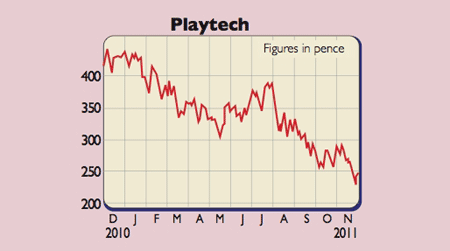
Last Wednesday, against a backdrop of bank deleveraging and frozen capital markets, gaming firm Playtech announced a £100m placing of 46.5 million shares at 215p each. The proceeds are to be used to fund acquisitions and establish new joint ventures. Although no specific details were provided, I suspect this will beef up its presence in regulated markets.
The newly issued shares, equivalent to 16% of the enlarged entity, have been underwritten by Brickington, a company owned by founder and Israeli entrepreneur Teddy Sagi. New institutional money absorbed £39m of the placing, meaning that Brickington has bumped up its holding to 43.7%. At the same time, the board “re-confirmed its commitment to move to the main market, and announced a revised dividend policy”. Henceforth, Playtech intends to distribute up to 40% of its earnings, with the March 2012 payout set to incorporate both the interim and final dividends. This means it will offer a jackpot yield of 6%.
What’s more, trading is proving robust, with fourth-quarter “daily average revenues up 5% sequentially on the third quarter”. Its IT platform is best-in-class, providing online, TV and mobile games, including casino, poker, bingo and sports betting. These are promoted by its partners in Europe, Asia and elsewhere. Its state-of-the-art games are typically sold on a revenue-share model to blue-chip clients such as Betfair, Rank, Paddy Power, Gala Coral, Betfred, Ladbrokes and Bet365. It has also dipped its toe in the important American market by concluding a strategic partnership with US lottery provider, Scientific Games.
Playtech (Aim: PTEC)
Broker Daniel Stewart is projecting 2012 revenues and underlying earnings per share (EPS) of €183m and 40.7 cents respectively, together with a 16.3 cents per share dividend. I rate the stock on a 12 times earnings multiple. Discounting back at 12%, that delivers a fair value of 330p a share.
What about the risks? First, internet gambling stocks are not for the faint-hearted, especially given the sector’s history of run-ins with regulators and its exposure to shrinking consumer incomes. Next, William Hill has an option to buy out Playtech’s stake in 2013 or 2015, while the top five licensees contributed 49% of revenues. There are also foreign-exchange risks to consider. Lastly, there’s Mr Sagi’s creeping influence over the group, which could in future raise questions around corporate governance.
Nonetheless, with Playtech moving up from the Aim market on to the LSE main list, where minority shareholders obtain better regulatory protection, the company is well worth a look. Investment bank Daniel Stewart has a price target of 462p.
Rating: SPECULATIVE BUY at 237p
• Disclosure: I own shares in Playtech